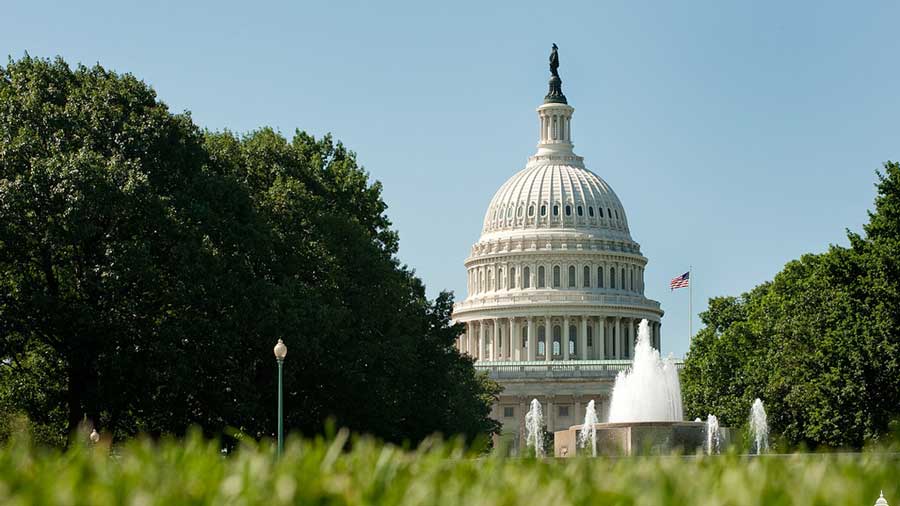Senate Commerce Approves C-Band Auction Bill

The smarter way to stay on top of broadcasting and cable industry. Sign up below
You are now subscribed
Your newsletter sign-up was successful
In a straight party-line vote, the Republican-controlled Senate Commerce Committee has favorably reported out an amended bill that would require the FCC to auction, by the end of 2020, at least 280 MHz of C-Band spectrum for 5G, with at least half of the gross proceeds, and potentially more, going to the U.S. Treasury and 10% to rural broadband buildouts.
The auction would have to be held by the end of 2020.
That came at an executive session Wednesday (Dec. 11) at which the committee was marking up a number of bills. After voting on the other dozen or so bills with essentially no debate or comment, the 5G Spectrum Act took center stage for some debate over how the proceeds should be spent.
Related: Senate Commerce to Mark Up C-Band Bill
Next stop for the bill is a Senate floor vote, then a vote in the Democrat-controlled House, or reconciliation with their take on the issue.
Democrats argued that allowing even 50% of the proceeds to go to the satellite operators who would have to give up the spectrum for terrestrial mobile broadband was a payoff to foreign companies (Intelsat and SES [both Luxembourg, Telesat [Canada] and Eutelsat [France]) at the expense of using the proceeds to build out rural broadband and aid first responders.
Republicans fired back that they were as dedicated to rural buildouts and firefighters and law enforcement as anyone else, as well as keeping as much of the money in country as possible, but that the FCC needed to incentivize the satellite operators beyond paying moving costs in order to get them to move off the spectrum quickly and not to tie up the auction in court challenges if they were not compensated for the spectrum.
The smarter way to stay on top of broadcasting and cable industry. Sign up below
Related: CBA's Pitsch Says FCC C-Band Auction Could Mean Legal Delays
Ranking member Maria Cantwell (D-Wash.) said that a potential 50% cut of the billions in proceeds went beyond incentivizing to paying them off.
Again on a straight party-line vote, Republicans defeated an amendment from Sen. Brian Schatz (D-Hawaii) that would have prevented the "payout" and instead reserved any proceeds beyond compensating satellite operators for relocation expenses for things like rural broadband, telehealth, public safety, and e-government. Schatz said none of the money would be given as a "windfall" to foreign satellite companies.
Sen. Roger Wicker (R-Miss.) pointed to some things in the amendment beyond that issue that prompted him to oppose it, specifically that it would not allocate as much spectrum as the base bill, and would delay the auction.
Sen. Schatz, anticipating defeat, said if his amendment did go down on a party line vote, he hoped both sides would find the "deal space."
Cantwell, who had urged passage of the Schatz amendment, said Wicker-Thune bill provided a prize for foreign companies rather that for the American taxpayer.
Wicker said it was unfair to characterize those who supported his bill that way. He said their goal was to make as much of the proceeds available for the Treasury as possible and only pay satellite companies as much as was required "to satisfy the law and get the matter conducted."
But Cantwell wasn't backing down. She said those who wanted to put the interests of foreign companies ahead of rural residents, police and firefighters could go ahead and vote that way.

Bill co-sponsor John Thune fired back that he took a back seat to no one in standing up for rural America, but that this was about winning the race to 5G and its economic benefits. He said China wasn't having these discussions. It was freeing up midband spectrum for 5G. He said they have to provide incentives for those who occupy the band and pointed out that the 50% going to the treasury was more than the 35% that the Treasury got when broadcasters were compensated for moving off their spectrum.
Cantwell suggested there was a difference, though it was unclear whether she meant that broadcasters were not foreign companies or that they deserved compensation for moving while satellite operators didn't.
Thune also pointed out the bill said a minimum of 50% had to go to Treasury and that the FCC could take "a lot more" if necessary.
FCC chair Ajit Pai has already signaled that the FCC plans to auction the 280 MHz and will circulate an order to that effect early next year.
"The CBA has consistently supported legislative initiatives that advance the FCC’s efforts to safely clear extremely valuable mid-band spectrum to enable 5G in the U.S. Today’s committee vote represents a good step in that direction and we thank Senators Wicker and Thune for their vigorous engagement," said the C-Band Alliance, which comprises the majority of satellite operators giving up spectrum. "The fast and safe clearing of a portion of the C-band is essential so the U.S. can maintain its global technology leadership and reduce security and defense concerns with respect to our national telecommunications infrastructure, all while protecting the TV and radio services valued by nearly 120 million American households. We will continue to work with members of Congress and the FCC to reach the best outcome for the United States: a solution that quickly clears badly-needed C-band spectrum for 5G and acknowledges the CBA member companies’ role in the process, their legal rights and their significant investments over decades in the operating C-band ecosystem."
Contributing editor John Eggerton has been an editor and/or writer on media regulation, legislation and policy for over four decades, including covering the FCC, FTC, Congress, the major media trade associations, and the federal courts. In addition to Multichannel News and Broadcasting + Cable, his work has appeared in Radio World, TV Technology, TV Fax, This Week in Consumer Electronics, Variety and the Encyclopedia Britannica.

